
Agelenopsis, commonly known as the American grass spiders, is a genus of funnel weavers described by C.G. Giebel in 1869. They weave sheet webs that have a funnel shelter on one edge. The web is not sticky, but these spiders make up for that by running very rapidly. The larger specimens can grow to about 19 mm in body length. They may be recognized by the arrangement of their eight eyes into three rows. The top row has two eyes, the middle row has four eyes, and the bottom row has two eyes. They have two prominent hind spinnerets, somewhat indistinct bands on their legs, and two dark bands running down either side of the cephalothorax.

The Agelenidae are a large family of spiders in the suborder Araneomorphae. Well-known examples include the common "grass spiders" of the genus Agelenopsis. Nearly all Agelenidae are harmless to humans, but the bite of the hobo spider may be medically significant, and some evidence suggests it might cause necrotic lesions, but the matter remains subject to debate. The most widely accepted common name for members of the family is funnel weaver.
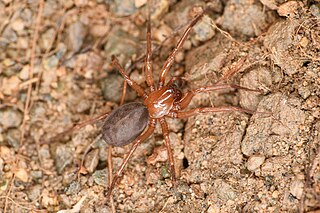
Cybaeidae is a family of spiders first described by Nathan Banks in 1892. The diving bell spider or water spider Argyroneta aquatica was previously included in this family, but is now in the family Dictynidae.

Heteroceridae, the variegated mud-loving beetles, are a widespread and relatively common family of beetles found on every continent except for Antarctica.

Scutigeridae is a family of centipedes that are known as house centipedes. It includes most species of house centipedes, including Scutigera coleoptrata and Allothereua maculata.
Xyletomerus is a genus of death-watch and spider beetles in the family Ptinidae. There are at least two described species in Xyletomerus.
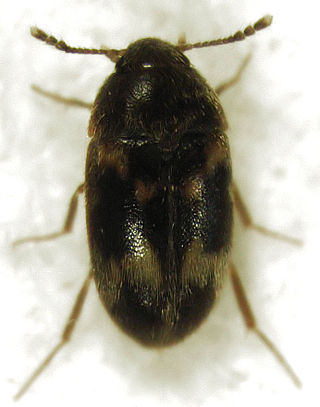
The Mycetophagidae or hairy fungus beetles are a family of beetles in the superfamily Tenebrionoidea. The different species are between 1.0 and 6.5 mm in length. The larvae and adults live in decaying leaf litter, fungi, and under bark. Most species feed on fungi. Worldwide, the 18 genera contain around 200 species.
Barronopsis is a genus of funnel weavers first described by R. V. Chamberlin & Ivie in 1941.
Calilena is a genus of North American funnel weavers first described by R. V. Chamberlin & Wilton Ivie in 1941.

Pityohyphantes, commonly known as hammock spiders, is a genus of sheet weavers that was first described by Eugène Louis Simon in 1929. The name comes from the Ancient Greek Πίτυς (pitys), meaning "pine", and hyphantes, meaning "weaver".
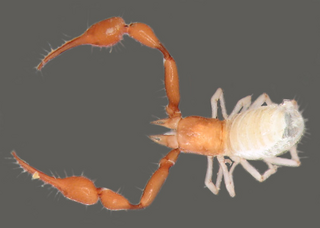
Syarinidae is a family of pseudoscorpions in the order Pseudoscorpiones. There are at least 20 genera and 110 described species in Syarinidae.
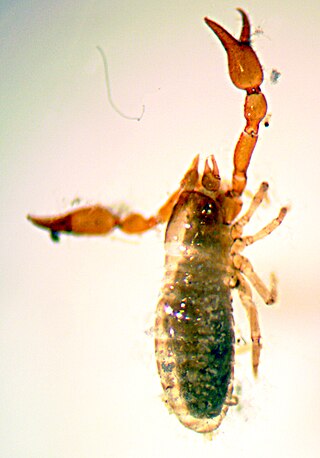
Microbisium is a genus of pseudoscorpions in the family Neobisiidae. There are about 12 described species in Microbisium.

Bostrichini is a tribe of horned powder-post beetles in the family Bostrichidae. There are about 16 genera and at least 150 described species in Bostrichini.

Strigamia is a genus of soil centipedes in the family Linotaeniidae found in temperate parts of the Holarctic region. Members of this family can be identified by their anteriorly tapering bodies, the extra claw on the forcipules, scattered coxal pores, and the distinctly swollen ultimate legs of the males. The generic name is from Latin striga, "strip," referring to its strip of bristles.

Tigrosa annexa is a species of wolf spider (Lycosidae) native to eastern North America from Texas, east to Florida, and north to Ohio.
Microlinyphia mandibulata is a species of sheetweb spider in the family Linyphiidae. It is found in the United States.

Geolycosa xera, or McCrone's burrowing wolf spider, is a species of wolf spider (Lycosidae) endemic to Florida in the United States.

Steatoda albomaculata is a species of cobweb spider in the family Theridiidae. It is found in North America, Europe and Russia, North Africa, Israel, Kazakhstan, Iran, Central Asia, China, Korea, Japan.
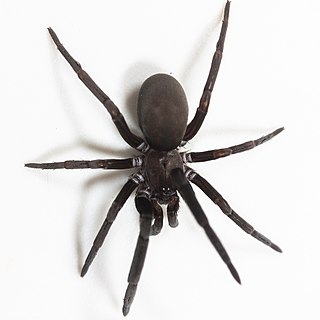
Kukulcania geophila is a species of crevice weaver in the family of spiders known as Filistatidae. It is found in the United States and Mexico.
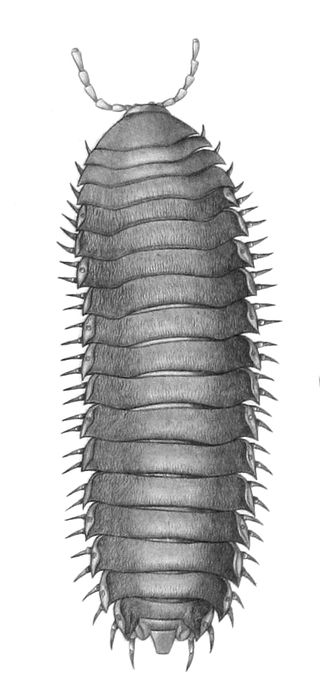
Rhysodesmus is a genus of flat-backed millipedes in the family Xystodesmidae. There are at least 90 described species in Rhysodesmus., ranging from El Salvador to the Southern United States.















